More than just a career, nursing is a calling built on compassion, dedication, and resilience. Nurses are often described as the backbone of healthcare. They provide medical care. Additionally, they offer emotional support, advocate for patients, and work side by side with doctors and other healthcare professionals. This ensures the best outcomes.
With the global demand for qualified nurses steadily increasing, it’s no surprise that many people are asking the same question: how to become a nurse? The path may seem overwhelming at first, but with the right guidance, it becomes much clearer.
In this guide, we’ll walk through everything you need to know:
- The steps to become a registered nurse.
- The different nursing education requirements and program options.
- Exactly how long it takes to be a nurse, depending on your path.
- The essential skills needed to be a successful nurse.
- A realistic look at a day in the life of a nursing student.
- And finally, the diverse career pathways after becoming a nurse.
By the end, you’ll have a clear roadmap of what it takes to enter this rewarding profession—and hopefully, the inspiration to take your first step toward becoming a nurse.
How to Become a Nurse: Important Factors for Success
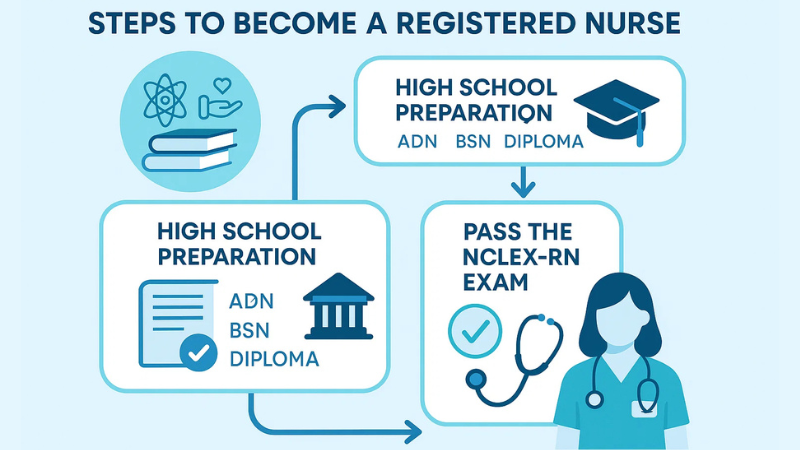
1. Steps to Become a Registered Nurse
If you’re serious about pursuing a nursing career, the path to becoming a registered nurse (RN) begins long before your first day in scrubs. While the journey requires dedication, planning, and hands-on experience, it’s also incredibly rewarding. Here’s a step-by-step guide to help you understand what the process looks like.
Start Preparing in High School
Your nursing journey can actually begin in high school. If you’re still in school, focus on subjects like biology, chemistry, and math—these will give you a strong foundation for your future coursework.
But academics aren’t everything. Try volunteering at hospitals, nursing homes, or local clinics to get real-world exposure to healthcare. Not only does this experience help you decide if nursing is the right fit, but it also shows future nursing programs that you’re passionate and committed.
Enroll in a Nursing Program
The next step is choosing the right educational pathway. There are several ways to meet nursing education requirements, and your choice may depend on your career goals, timeline, and budget:
- Associate Degree in Nursing (ADN): A 2–3 year program that prepares you for entry-level nursing positions. Many nurses start here and later continue their education.
- Bachelor of Science in Nursing (BSN): A 4-year degree that opens up broader career opportunities, including leadership, specialized nursing roles, and advanced study.
- Hospital Diploma Programs: While less common today, some hospitals still offer diploma programs that combine classroom instruction with hands-on training.
Pass the Licensure Exam
Graduating isn’t the finish line—every aspiring nurse must pass the NCLEX-RN (National Council Licensure Examination for Registered Nurses). This standardized exam tests your knowledge and decision-making skills to ensure you’re ready to provide safe, effective care.
Gain Clinical Experience
During your nursing program, you’ll complete supervised clinical rotations in hospitals and clinics. These experiences allow you to apply classroom knowledge in real patient-care situations. After graduation, many hospitals also offer residency programs designed to help new nurses transition smoothly into full-time practice.
Whether you choose an ADN, BSN, or diploma program, these are the essential steps to become a registered nurse. With each stage, you’ll move closer to a career built on compassion, skill, and the ability to make a real difference in people’s lives.
2. Nursing Education Requirements
Education is the foundation of every nursing career. The type of degree or program you choose shapes not only how quickly you enter the workforce but also the kind of opportunities available to you down the road. Let’s break down the different nursing education requirements so you can decide which path aligns best with your goals.
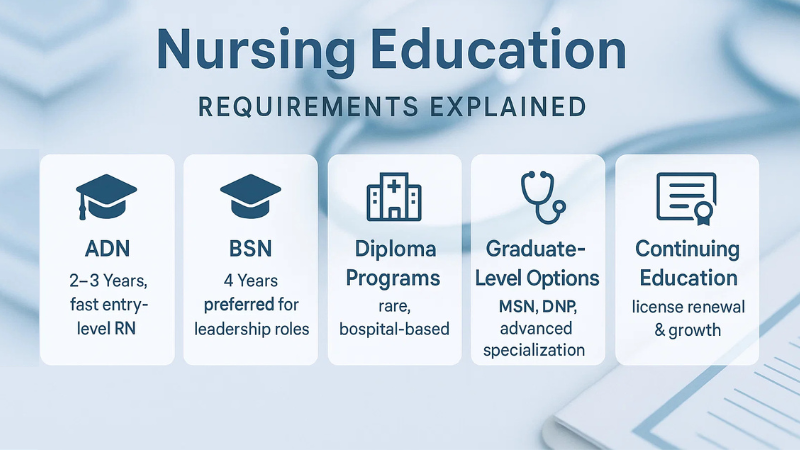
Associate Degree in Nursing (ADN)
For many aspiring nurses, the ADN is the fastest way to start working as a registered nurse. Typically taking 2–3 years to complete, this program prepares you for entry-level RN positions.
- Why choose it? It’s affordable, widely available, and lets you begin your career sooner.
- Things to consider: While an ADN allows you to take the NCLEX-RN and practice as a nurse, many hospitals now prefer candidates with a BSN. You may eventually decide to continue your education later.
Bachelor of Science in Nursing (BSN)
Today, the BSN has become the standard degree for most nurses. This program usually takes 4 years and provides a more comprehensive education compared to the ADN.
- Why choose it? A BSN opens the door to leadership roles, specialized nursing areas, and even graduate school opportunities.
- Added advantage: Many hospitals—especially those with Magnet status—prefer or require nurses to have a BSN, as it reflects higher standards of patient care.
Curious which one pays more? Check out the ADN vs BSN nursing degree salary structure difference
Diploma Programs
Once a very common way to enter nursing, diploma programs are now rare. They are mostly offered in hospital-based settings and combine classroom instruction with hands-on experience.
- Why choose it? These programs are practical and provide solid clinical training.
- Things to consider: They’re generally less comprehensive than BSN programs, and career advancement options may be more limited without additional education.
Graduate-Level Options
If you’re aiming higher in your career, advanced nursing degrees offer even more opportunities:
- Master of Science in Nursing (MSN): Ideal if you want to become a Nurse Practitioner, Nurse Educator, or Clinical Nurse Leader.
- Doctor of Nursing Practice (DNP): Perfect for those seeking advanced leadership or specialized practice roles.
These degrees require more time and investment but lead to greater autonomy and earning potential.
Continuing Education
Becoming a nurse isn’t the end of your educational journey—it’s just the beginning. Healthcare is constantly evolving, and nurses must stay updated with the latest practices, technology, and patient care standards.
- Many states require continuing education credits for license renewal.
- Beyond that, ongoing learning ensures you remain confident, competent, and competitive in your field.
These are the nursing education requirements explained clearly—giving you flexible options depending on your career goals, whether you’re aiming to get started quickly, move into leadership, or specialize further.
3. How Long Does It Take to Be a Nurse?
One of the most common questions aspiring nurses ask is: “How long will it take before I can start working as a nurse?” The truth is, the timeline depends on the educational path you choose and how far you want to advance in your career. Let’s break it down clearly:
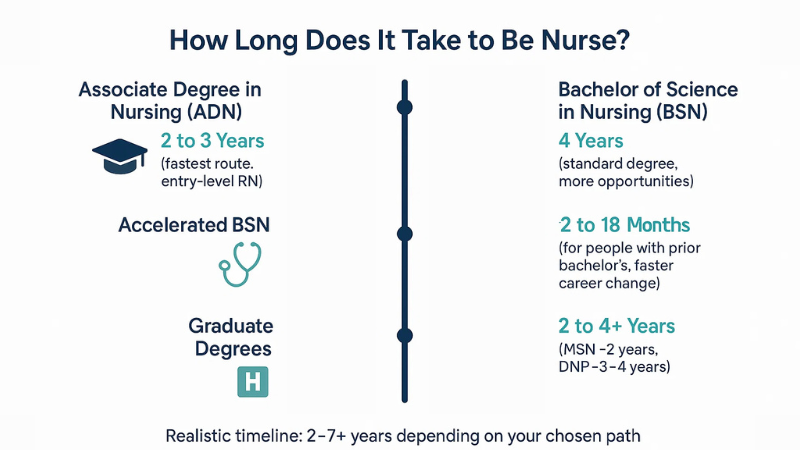
Associate Degree in Nursing (ADN) – 2 to 3 Years
An ADN program is the fastest route to becoming a registered nurse. In just 2–3 years, you can complete your coursework and clinical training, then take the NCLEX-RN exam to get licensed. Many people choose this path when they want to enter the workforce quickly and gain hands-on experience.
Bachelor of Science in Nursing (BSN) – 4 Years
The BSN is considered the standard degree for today’s nurses. It typically takes 4 years to complete and provides a more in-depth education compared to the ADN. While it takes longer, it also comes with advantages: more job opportunities, higher earning potential, and eligibility for specialized or leadership roles.
Accelerated BSN Programs – 12 to 18 Months
If you already have a bachelor’s degree in another field, you may qualify for an accelerated BSN program. These intensive programs condense nursing coursework into just 12–18 months, allowing you to make a career change much faster. Keep in mind, these programs are rigorous and require full-time commitment.
Graduate Degrees – 2 to 4+ Additional Years
For nurses who want to advance further, graduate-level study adds more time:
- Master of Science in Nursing (MSN): Usually 2 years and prepares you for advanced practice roles like Nurse Practitioner or Nurse Educator.
- Doctor of Nursing Practice (DNP): Often 3–4 years, ideal for leadership, policy-making, and specialized clinical practice.
Other Factors That Affect the Timeline
Your journey doesn’t only include classroom learning—it also involves:
- Completing prerequisite courses (such as anatomy, microbiology, or nutrition).
- Participating in clinical training to build hands-on skills.
- Preparing for and passing the NCLEX-RN exam to earn your license.
So, how long does it take to be a nurse? Realistically, anywhere from 2 years to 7+ years, depending on the level of education and specialization you pursue. The good news? Every step brings you closer to a career where you’ll make a real difference in people’s lives.
4. Required Skills to Be a Successful Nurse
Nursing is much more than following charts and administering treatments—it’s a profession that blends science, skill, and heart. To thrive in this career, nurses need a unique mix of hard skills (the technical, hands-on abilities) and soft skills (the human qualities that build trust and connection).
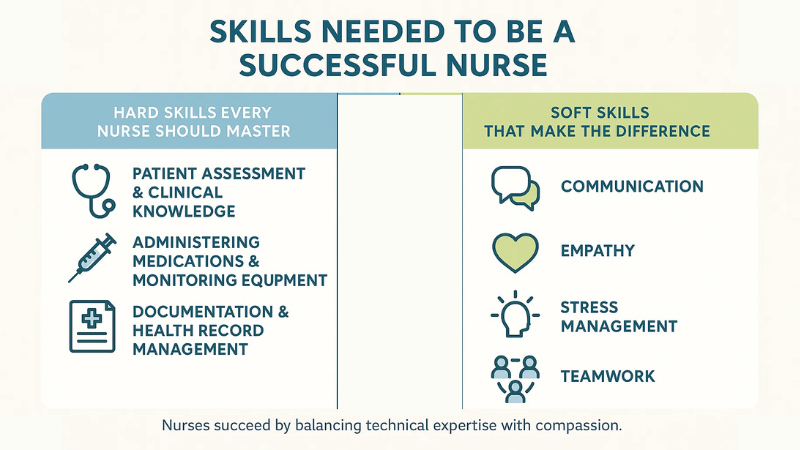
Hard Skills Every Nurse Should Master
These are the technical abilities that form the backbone of nursing practice:
- Patient Assessment and Clinical Knowledge
Nurses must be able to assess a patient’s condition accurately, notice subtle changes, and apply medical knowledge to guide care decisions.
- Administering Medications and Monitoring Equipment
From giving medications to reading vital signs on medical devices, precision and attention to detail are crucial. Even a small mistake can have serious consequences, which is why accuracy is a core nursing skill.
- Documentation and Health Record Management
Clear and accurate record-keeping ensures continuity of care. Nurses are responsible for updating charts, documenting treatments, and communicating important details to the entire healthcare team.
Soft Skills That Make the Difference
While technical skills are important, soft skills are what transform a good nurse into a great nurse.
- Communication:
Nurses are often the bridge between patients, families, and doctors. Strong communication skills help explain complex information in simple terms and ensure patients feel heard and understood.
- Empathy:
Patients aren’t just cases or charts—they’re people who may be scared, in pain, or anxious. Showing compassion helps build trust and provides comfort during difficult moments.
- Stress Management:
Nursing shifts can be long, unpredictable, and emotionally demanding. The ability to stay calm under pressure allows nurses to provide consistent, high-quality care—even in challenging situations.
- Teamwork:
Healthcare is never a solo effort. Nurses work side by side with doctors, specialists, and other healthcare professionals. Collaboration and respect for one another’s roles are essential for the best patient outcomes.
These are the skills needed to be a successful nurse. By balancing technical expertise with compassion, nurses not only provide excellent medical care but also bring humanity and comfort to those who need it most.
5. Daily Life of a Nursing Student: Understanding the Struggles
Becoming a nurse is incredibly rewarding, but getting there takes dedication and resilience. Nursing school isn’t just about textbooks and exams—it’s about learning to balance knowledge, skill, and compassion all at once. Curious what a day in the life of a nursing student actually looks like? Let’s walk through it together.
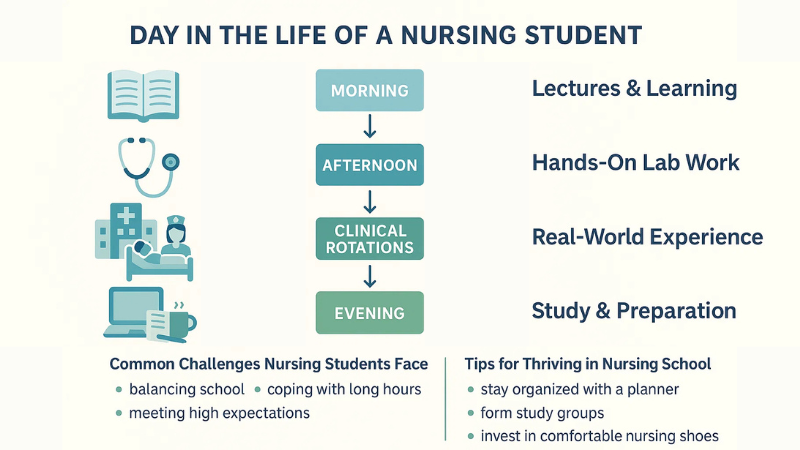
Morning: Lectures and Learning
Most days start early with classes covering subjects like anatomy, pharmacology, or nursing theory. These lectures provide the foundation you’ll rely on when caring for patients. Some mornings might feel overwhelming with the sheer amount of information, but remember—every detail prepares you for real-world nursing practice.
Afternoon: Hands-On Lab Work
After the classroom comes the lab. Here’s where you practice essential nursing skills such as inserting IVs, checking vital signs, or performing patient assessments. Labs are safe learning spaces where mistakes are part of the process, giving you confidence before stepping into actual clinical settings.
Clinical Rotations: Real-World Experience
Perhaps the most exciting (and sometimes nerve-wracking) part of nursing school is the clinical rotation. During these shifts, you shadow professional nurses in hospitals, clinics, or long-term care facilities.
This is where theory meets practice—you’ll interact with patients, observe treatments, and gradually take on responsibilities under supervision. It’s often the part of training that makes nursing students fall in love with the profession.
Evening: Study and Preparation
The day doesn’t end when you leave the hospital or classroom. Evenings are often spent reviewing lecture notes, preparing for exams, or collaborating on group projects. Many students also squeeze in part-time work or family responsibilities, making time management a critical skill.
That’s it? Not at all. The next day, you have to stand on your feet all day again. So you must take care of your feet to prepare them for the strain you’re gonna go through again. Proper steps to prevent foot pain from standing all day and going for the correct shoes can help you with that.
Which shoes should you choose? Confused again? Don’t worry, we’ve selected the best shoes for your busy day so that you can focus fully on your studies and duties.
Common Challenges Nursing Students Face
It’s no secret that nursing school is tough. Students often struggle with:
- Balancing school, clinicals, and personal life.
- Coping with long hours and heavy workloads.
- Meeting high expectations from instructors and preceptors.
Tips to Thrive in Nursing School
The journey isn’t easy, but with the right strategies, you can succeed—and even enjoy the process.
- Stay organized with a planner or digital calendar to manage assignments and rotations.
- Form study groups—discussing topics with peers makes complex concepts easier to understand.
- Invest in comfortable nursing shoes for clinical rotations (trust us, your feet will thank you after a 12-hour shift!).
This is a glimpse into the day in the life of a nursing student—a balance of hard work, personal sacrifice, and small victories. While the path is challenging, every lecture, lab, and clinical shift is a step closer to becoming the nurse you’ve always dreamed of being.
6. Career Pathways After Becoming a Nurse
Earning your RN license is just the beginning. One of the best parts of nursing is the wide range of career opportunities available, allowing you to shape your path around your passions, skills, and long-term goals. Let’s explore the diverse career pathways after becoming a nurse.
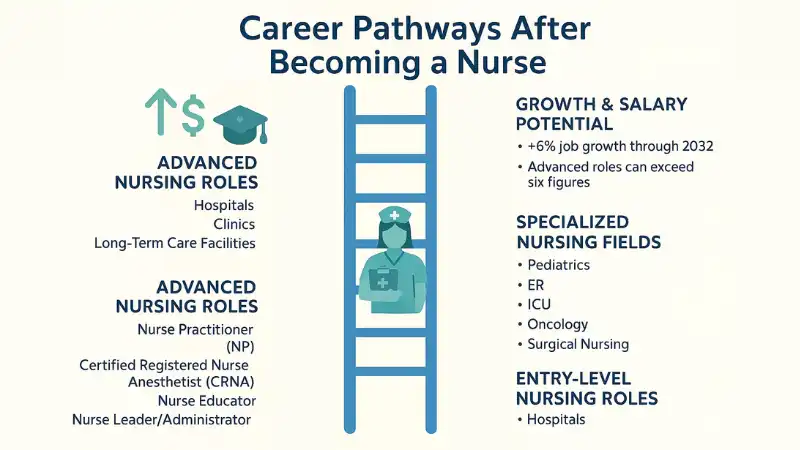
Entry-Level Nursing Roles
Most nurses begin their careers in entry-level positions, gaining valuable bedside experience. You can work in:
- Hospitals: Caring for patients in medical-surgical units, ER, or specialized wards.
- Clinics: Supporting physicians and providing direct patient care in outpatient settings.
- Long-Term Care Facilities: Assisting elderly patients or those with chronic conditions in nursing homes or rehabilitation centers.
These roles help build a strong foundation for your nursing career.
Specialized Nursing Fields
As you gain experience, you may discover a passion for a particular area of care. Specializations allow you to focus on patients with unique needs, such as:
- Pediatrics: Caring for children and adolescents.
- Emergency Room (ER): Fast-paced, urgent care for critical cases.
- Intensive Care Unit (ICU): Providing advanced care to critically ill patients.
- Oncology: Supporting patients undergoing cancer treatment.
- Surgical Nursing: Assisting in pre- and post-operative care.
Specializing not only deepens your expertise but can also open doors to higher pay and career advancement.
Advanced Nursing Roles
For nurses looking to move beyond bedside care, pursuing graduate education can unlock advanced practice and leadership opportunities:
Diagnose, treat, and prescribe medication—often with a high degree of autonomy.
Provide anesthesia during surgeries and medical procedures.
Teach and mentor the next generation of nurses.
Oversee departments, manage staff, and shape healthcare policies.
These roles require additional education (MSN or DNP) but offer greater responsibility, independence, and earning potential.
Growth & Salary Potential
The demand for nurses continues to rise. According to the U.S. Bureau of Labor Statistics, nursing jobs are projected to grow by more than 6% through 2032—faster than the average for most professions.
- Entry-level RNs enjoy steady salaries and job security.
- Advanced roles such as NPs or CRNAs can significantly boost earning potential, sometimes exceeding six figures annually.
Whether you’re just starting out or planning your next step, the career pathways after becoming a nurse are flexible, rewarding, and full of opportunities for growth.
Conclusion
From learning the steps to become a registered nurse and understanding the nursing education requirements, to figuring out how long it takes to be a nurse and mastering the skills needed to be a successful nurse, every stage builds toward a career that truly changes lives.
Yes, the road can be challenging. Nursing school is intense, the exams are demanding, and the workload can feel overwhelming at times. But with every lecture, every clinical rotation, and every patient interaction, you’re moving closer to becoming the kind of professional who makes a difference when it matters most.
FAQs: How to Become a Nurse
What are the first steps to becoming a nurse?
Start with high school preparation in science/math, then pursue an accredited nursing program (ADN or BSN).
Is it better to get an ADN or a BSN?
A BSN offers broader opportunities, but ADN programs are faster and more affordable.
How long does nursing school really take?
2–4 years, depending on the program (longer for advanced roles).
What skills do nursing schools look for?
Strong academics, communication skills, empathy, and resilience.
What’s it like to be a nursing student day-to-day?
Busy, challenging, but rewarding — filled with lectures, labs, clinicals, and studying.

Leave a Reply